The new man, dreamed up by el Che, does not exist and will never exist, if he is not born from above.
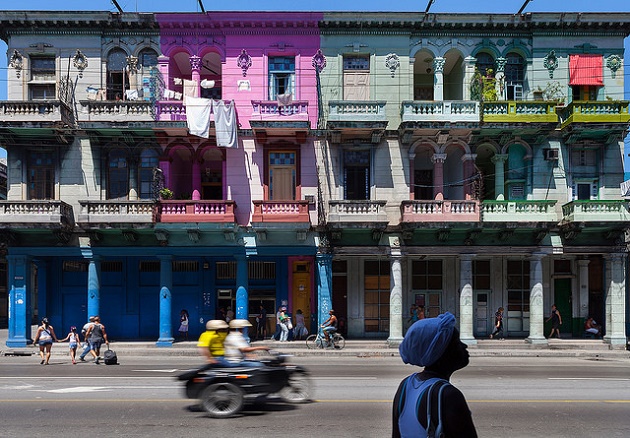 A view of Havana, in Cuba. / Angelo Domini (Flickr, CC)
A view of Havana, in Cuba. / Angelo Domini (Flickr, CC)
We have all had dreams that have fallen by the wayside. Years go by and we have to live with the frustration of that which could have been but isn’t. Each generation imagines a new world, but it is not long before we are forced to deal with feelings of melancholy brought on by lost opportunities.
The film “Return to Ithaca” (Return to Ithaca) is now out on DVD, and I watched it with my daughter. The movie by the French director, Laurent Cantet, is based on the book by the Cuban writer Leonardo Padura, “The Story of my Life”. In the book, a group of old friends are reunited on one of the terraced roofs of La Habana. There, the Cuban Amadeo (Nestor Jimenez) meets his former revolutionary comrades after sixteen years of living in Madrid.
The passing of time has left its trace in so many frustrated aspirations. There is a weariness of life, but also a sense of anger, which goes beyond disillusionment. All the characters feel that they have been robbed of their lives and even that they themselves have contributed to that theft in one way or another: they have been betrayed and they have betrayed themselves.
BEYOND NOSTALGIA
On this terrace overlooking the roofs around the Malecón, these fifty-year olds remember the years of their youth, where music occupied a central role. Although I know that it was the last colony, I am surprised by how many references there are to Spain, when their dictatorships were so different. However, you only have to think of the close relationship that Fraga, a Spanish minister under Franco, developed with Fidel Castro, who went so far as to visit Galicia in 1992, on Fraga’s invitation.
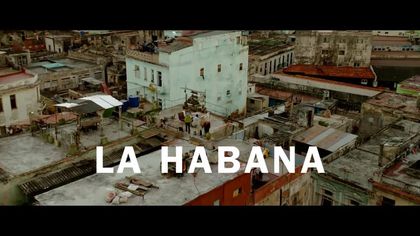 This is a story of broken dreams in La Habana.
This is a story of broken dreams in La Habana.The film begins with the friends dancing to the song “Eva Maria se fue buscando el sol en la playa” (Eva Maria left in search of sun on the beach), the Spanish summer hit of 1973, popularized by the Madrileño band, Formula V. The character of Jorge Perugorría is obsessed by Joan Manuel Serrat, and is still up to singing “Aquellas pequeñas cosas” (Those small things), one of the songs from his most famous albums, “Mediterraneo” (1971).
The painter played by Fernando Hechavarría (Rafa) looks through a book about Antoni Tapies, as he remembers his visit to his foundation in Barcelona. These things are reminiscent of the period before the Transition in Spain … Is this perhaps Cuba’s moment?
My daughter could not believe that, at that time, people were banned from listening to the Beatles, or the Rolling Stones. You couldn’t wear your hair long, or show any sign of “cultural penetration”. The very expression now sounds like a joke. But it had seemed so important to Rafa to be considered “excellent” in the Young Communist League, with the mere memory of the “Special Period” inspiring terror.
THE CULTURE OF EXILE
This reunion highlights tension between internal resistance and exile. While those who stayed criticize Amadeo for his lack of commitment, when he abandoned his sick wife for the comfort of a life in Madrid, he explains how life in Spain wasn’t all that easy. In fact, the twist in the film comes from his real reason for leaving the island.
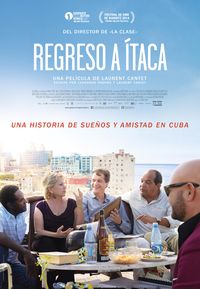 On a terrace overlooking the roofs around the Malecón, these fifty-year olds remember the years of their youth.
On a terrace overlooking the roofs around the Malecón, these fifty-year olds remember the years of their youth.Until I went to Cuba to teach anthropology in Jagüey Grande, my only knowledge of the island came from the culture of exile. I grew up surrounded by furniture that my great-grandfather collected when he worked as a military doctor in Cuba, but it was only when I was at school and at evangelical church in the 1970s, that I met the children of Cuban refugees. My parents helped several families, who were waiting for their visas to go to the United States. They arrived with just the shirts on their backs and my parents wrote to the churches in Holland to ask for donations of clothes for them.
In particular, I remember a friend of the poet Reinaldo Arenas – who committed suicide in New York after contracting AIDS and whose book “Before Night Falls”, when taken to the cinema, starred Javier Bardem –. Juan Peñate, who was mentioned in that book, was sent to an asylum where homosexuals and dissidents were tortured with electroshocks for receiving correspondence from Arenas. They both managed to leave port Mariel in 1980, without being able to take anything with them. Juan lost two university degrees, which he had to study again, while my parents helped him with food and clothes. He is perhaps the most cultured person that I have ever met.
THREE GENERATIONS
One of the surprising things about Cuba is that, as the saying goes, even the prostitutes have degrees. I know many Cuban doctors, but none of them can make ends meet from their work. This is the case of the character of Tania (played by Isabel Santos, a famous actress in Cuba), who is an ophthalmologists, but who depends on the money that her children send her from abroad. In her despair, she has turned to the superstitious rituals of African origin that are so popular in Cuba.
There are three generations in the film. The generation before Tania – a typical name in Cuba after the revolution, when everyone started giving their children Russian names – is that of the kind black grandmother, who looks after her son Aldo (Pedro Julio Díaz), an engineer who spends his time burning his hands by fitting batteries. Since his wife left him for an Italian, he has lived a meagre existence in the centre of La Habana – his house is where the reunion takes place –, surrounded by cross-balcony discussions and even the slaughter of a pig on another rooftop – this is Cuba!
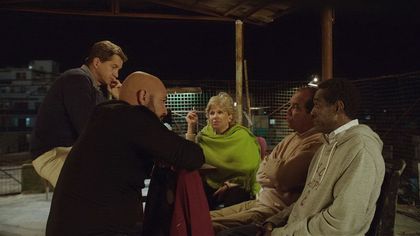 The passing of time has left its trace in so many frustrated aspirations.
The passing of time has left its trace in so many frustrated aspirations.Aldo’s son’s only thought is of leaving the island, to the distress of his father, who suffers great shame at the fact that his son has been caught stealing at all of his jobs. His girlfriend is an apathetic girl, who has no interest in anything. The generation of the resigned grandmother is followed by Tania’s frustrated generation, which is in turn followed by a generation that neither works nor studies. This is the future for which the parents sacrificed themselves…
THE REVOLUTIONARY CAST
The figure of Perugorría is another face of the revolution: the communist oligarchy which benefits from the privileges of its proximity to power. Just as Orwell observed in “Animal Farm”, “All animals are equal but some animals are more equal than others”. Behind his cynical and hedonist appearance as an opportunist and freeloader, there is a frustrated man, who tries to fill the void with trips abroad, driving around in a car, or the bottles of whisky that he gives to his friends.
It is clear that Amadeo is the alter ego of Padura, the most popular Cuban writer abroad, known for his Mario Conde detective novels and work like “The man who loved dogs”, about the assassination of Trotsky, which reveal the dark side of communism. Although he acquired double nationality in 2011 –he has also been given Spanish nationality –, his books are still published on the island, although the projection of the film has come up against some obstacles.
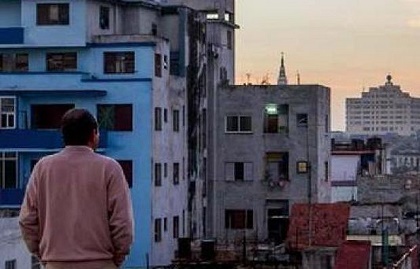 An image of the film.
An image of the film. They all see themselves as failures. Amadeo is a writer who has lost his inspiration; Rafa is a painter who has not been able to produce anything that seems worthwhile to him; Aldo is an engineer who makes batteries out of scrap metal; Eddy has stopped writing; and all that Tania has left is her bad humour. It isn’t surprising that they are full of resentment and recriminations, against one another…
IS A NEW MAN POSSIBLE?
Experiences like these, tell of how we believe in something, or someone, until they end up letting us down. We are disappointed with ourselves. Each of us, in our own way, is a disenchanted believer. Woody Allen recently said that he had been reading Primo Levi. The Italian writer of Sephardic origin, managed to survive Auschwitz only to then commit suicide for no apparent reason, throwing himself down the staircase of his house in 1987.
Allen said that he believed that Levi survived the horror of the camp due to his fervent belief in communism. He survived because he had a motivation but, when communism showed itself to be a failed system, that motivation disappeared. It is in that disillusionment that we perceive a reality that we cannot change. The new man, dreamed up by el Che, does not exist and will never exist, if he is not born from above…
Our hope is high above the sky that covers the islands that make up our lives. It comes from a stronger wind than the wind that cools the night of the Malecón. “The wind blows wherever it pleases. You hear its sound, but you cannot tell where it comes from or where it is going.” – says Jesus (John 3:8) –, but it makes all things new. This is the wind of the Holy Spirit, which brings with it a better world…

Las opiniones vertidas por nuestros colaboradores se realizan a nivel personal, pudiendo coincidir o no con la postura de la dirección de Protestante Digital.
Si quieres comentar o